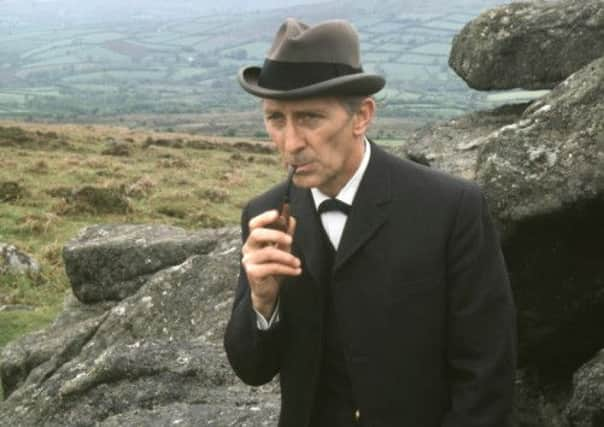Life in rep prepared Cushing for screen stardom


During the summer of 1942 Peter Cushing was in Bridlington. The war was at its height but Cushing was never to play an active part in it.
Instead of fighting for his country 29-year-old Cushing, who had struggled to return to England from a three-year sojourn playing small parts in Hollywood films, had to make do with performing with the Armed Forces’ entertainments’ unit, ENSA.
Advertisement
Hide AdAdvertisement
Hide AdHaving suffered from pernicious anaemia during his American travels, Cushing had been turned down for active service. Not yet 30 he was a sickly man whose reserves of energy were spent playing Elyot Chase in Noel Coward’s Private Lives.
Thus it was that Cushing spent his war treading the boards – continuing in the profession that had been an ambition since his days as a teenager at Purley County Secondary School.
In his later years Cushing would become one of the stable of stars for Hammer Films, enjoying huge popularity and success as Baron Frankenstein, Dr Van Helsing, Sherlock Holmes and sundry other antiheroes and villains.
He would also become arguably Britain’s first TV star in productions such as Anastasia, Pride and Prejudice, Beau Brummell and a groundbreaking 1954 adaptation of Nineteen Eighty-Four.
Advertisement
Hide AdAdvertisement
Hide AdBut before all of that came the salad days. Cushing gained his experience on Britain’s repertory circuit in the late 1930s. Later, after his Hollywood experience – he sailed there in January 1939 and, incredibly, worked alongside the likes of Carole Lombard and Laurel and Hardy – he came back to the English stage.
Much of his time was spent touring the provinces. With a 1945 production of While the Sun Shines he stopped off in Hull, Harrogate, Leeds and Bradford. Later, as a familiar TV face and quasi- star he would be the lead in a forgotten romance called The Wedding Ring that played at Leeds’s Grand Theatre in the summer of 1952.
As a performer Peter Cushing was a child of the now lost repertory movement. In the ’30s practically every town boasted its own theatre and resident company playing weekly rep. It was a period of enormous opportunity for an enthusiastic and ambitious young actor, and Cushing played in Worthing and Southampton before joining the William Brookfield Players in Rochdale.
With the same company he arrived in Scarborough in early 1938. The plays were the standard collection of country house dramas, farces, romantic comedies and lame thrillers, but it presented an intense learning curve for actors who were playing one role, rehearsing the following week’s and prepping for the week after that.
Advertisement
Hide AdAdvertisement
Hide AdInterviewed in Leeds in the summer of 1986 Cushing, who was on a promotional tour for his autobiography, recalled those far-off days of a half-century earlier. “I had been in rep, incidentally up in this area,” he told Peter Levy on Radio Aire. “It was wonderful the amount of repertory theatres there were [in the north]. I worked here a great deal.
“I used to play in this dear city of Leeds at the Grand Theatre. We used to use that for what they called the number one tours prior to London. If it went well in Leeds and Manchester you felt that you were going to be all right when you got back to the Big Smoke.”
In a movie career lasting 47 years Cushing never set celluloid foot in Yorkshire save for one mysterious project that never saw the light of a projector. For two months in 1944 he worked with the playwright Rodney Ackland on a 20-minute documentary short entitled The New School.
It was commissioned by the Ministry of Education, produced by the Crown Film Unit and shot on location in Ilkley. Ackland contrasted a cramped mid-Victorian council school with a modern, progressive counterpart. Finished and presented to its government masters it was promptly banned.
Advertisement
Hide AdAdvertisement
Hide AdThe historian Paul Rotha managed to screen it during the 1950s in a season of Government-sponsored films that were commissioned, completed, viewed and ultimately mothballed. Since then it has vanished. Today it is considered a “lost” film.
Was Peter Cushing the unwitting star of a quietly subversive documentary that dared to break the restrictive mould of wartime propaganda? Cushing was never a reactionary and the film – it would have marked his English debut – was just a job.
But, perhaps somewhere, it still exists – a black-and-white record of one of our beloved actors before fame came knocking.
A veteran of stage, film and TV
Peter Cushing was born in Kenley, Surrey, on May 26, 1913, the second son of George Edward and Nellie Maria (King) Cushing. This Sunday marks the centenary of his birth.
Advertisement
Hide AdAdvertisement
Hide AdWhile famous for his apperances in the Hammer Films, Cushing was also arguably Britain’s first TV star thanks to appearances in productions like Anastasia, Pride and Prejudice, Beau Brummell and a groundbreaking 1954 adaptation of Nineteen Eighty-Four.
His final engagement was as co-narrator of Flesh and Blood, the Hammer Heritage of Horror in 1994.